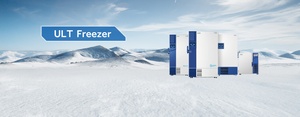Cold Storage Products
Cryogenic equipment is used to contain liquid nitrogen (LN2) for controlled freezing and low-temperature storage of biologic, genomic, and diagnostic samples. It may generate, sustain, or operate at extremely low temperatures and hold or assist with transportation of supercooled liquids or products that are perishable or not heat stable. Equipment for safely storing and transporting samples in LN2 is also available, including tubes and boxes for storing samples, equipment for grinding frozen samples, and vessels for transporting and storing LN2 itself. LN2 storage devices range in capacity from 1 L to close to 200 L. They may also be categorized by the number of samples they can accommodate. Cryogenic equipment also includes ultra-low temperature (ULT) freezers, freezers, and refrigerators. The general division between refrigeration and cryogenics is a temperature of −180°C (−292°F). What Are the Different Types of Cryogenic Equipment? • Dewar flasks and LN2 containers are double-walled and have a high vacuum between the walls that prevents the transmission of heat to their contents. They are typically used as holding tanks for LN2 and other cryogenic liquids • Smaller transfer vessels store and dispense small amounts of LN2 in portable, low-loss containers, and are often used for dispensing into other cryogenic vessels • LN2 supply tanks safely transport cryogenic industrial gases and are designed to be both durable and user friendly • Dual storage systems are designed to store and ship samples and feature hard-shell shipping containers • Specialized cryogenic sample storage systems increase valuable lab space and are designed for both liquid- and vapor-phase storage. They feature automated temperature monitoring and microprocessor-based LN2 level control • Vials, racks, box systems, and storage canes economically store samples and make cryogenic sample retrieval simple. A range of 2D barcoding products is also available to code individual tubes or complete microplate racks to help with sample identification • Benchtop cooling systems provide sample cooling or freezing to minimize freeze/thaw cycles when handling samples View More View Less
Freezers are used to store commonly used samples in industrial, clinical, and research samples between -10°C to -150°C. Upright, chest, and countertop models are available. Enzyme freezers are used for storage applications that are incompatible with temperature fluctuations that result during auto-defrost cycles of standard freezers. Models are available for the safe storage of flammable or volatile materials. Plasma freezers are specifically designed for the storage of plasma. Laboratory freezers are used for short- or long-term storage of biological, pharmaceutical, and other laboratory samples within specific temperature ranges. Designs vary based on sample types and space requirements. Typically, laboratory freezers: Include upright, chest-style, benchtop, or under-counter models Offer variable structural options (solid or clear doors, shelves or drawers, multiple internal compartments, etc.) Range in capacity from 1.3 cu. ft. (L) to 80 cu. ft. (2,265.35L) Require manual defrosting to remove ice build-up View More View Less
Refrigerator and freezer accessories include repair components, replacement parts, and support products that are specifically intended for cryopreservation systems. A variety of support products are available. Racks, bins, dividers, and shelves increase usable space in the refrigerator or freezer. Rollout drawers provide a convenient alternative to open shelving. Remote monitoring systems, chart recorders, sensors, alarms, and access keys help ensure secure storage. Repair components and replacement parts include: batteries, chart recorder paper, air filters, and hoses. View More View Less
Refrigerators are essential pieces of equipment for many research, clinical, or industrial laboratories, healthcare clinics, and mortuary facilities. General-purpose refrigerators are available for daily laboratory use, as are specialized refrigerators that are designed for specific applications--for example, blood bank and pharmacy refrigerators. All refrigerators are designed to maintain a stable temperature. Most models come in a variety of sizes and configurations to meet space and storage needs. Many include temperature alarms and other security features, such as locks or chart recorders. Do you need a pharmacy refrigerator for storage of vaccines or another application? Contact us to receive more information about products and services for refrigerator ranges. Why choose a lab refrigerator? Lab refrigerators are manufactured in a wide range of capacities and are available as upright, under-counter, or benchtop units with solid or glass doors. Many different options are available, including programmable displays and alarms, remote monitoring and access ports, and a range of refrigerator and freezer accessories. Together with freezers, lab fridges are essential items for research, clinical, pharmacy, and industrial settings. They are designed for both general use and special purposes. General-purpose lab refrigerators and pharmacy refrigerators Maintain a controlled environment for specimens and other temperature sensitive samples such as vaccines Flammable and explosion proof refrigerators These models are used when precautions are required whilst cooling explosive or flammable materials. The units contain advanced components and controls that are insulated and the refrigerator is hard-wired to prevent sparks, ensuring the contents are stored as safely as possible. Ideal for chemicals and hazardous substances Forced air refrigerators These models are energy efficient units for precise temperature control. Designed for better cooling performance, rapid temperature recovery, stability and uniformity. They feature alarms for over- and under-temperature, power failure and have a battery back-up system Forced air models are the ideal choice for blood banks and storing blood components View More View Less




 0
0



